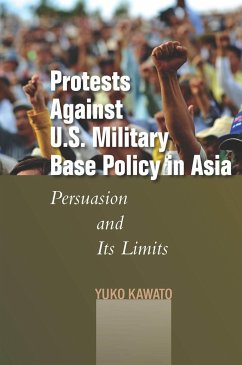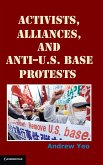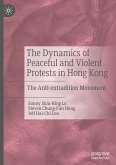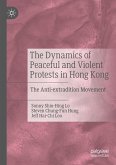- Gebundenes Buch
- Merkliste
- Auf die Merkliste
- Bewerten Bewerten
- Teilen
- Produkt teilen
- Produkterinnerung
- Produkterinnerung
Yuko Kawato is a Research Fellow at the Asia Center, a think tank in Paris, France.
Andere Kunden interessierten sich auch für
![Activists, Alliances, and Anti-U.S. Base Protests Activists, Alliances, and Anti-U.S. Base Protests]() Andrew YeoActivists, Alliances, and Anti-U.S. Base Protests104,99 €
Andrew YeoActivists, Alliances, and Anti-U.S. Base Protests104,99 €![The Dynamics of Peaceful and Violent Protests in Hong Kong The Dynamics of Peaceful and Violent Protests in Hong Kong]() Sonny Shiu-Hing LoThe Dynamics of Peaceful and Violent Protests in Hong Kong93,99 €
Sonny Shiu-Hing LoThe Dynamics of Peaceful and Violent Protests in Hong Kong93,99 €![The Gate to China The Gate to China]() Michael SheridanThe Gate to China30,99 €
Michael SheridanThe Gate to China30,99 €![Japan's Nuclear Disarmament Policy and the U.S. Security Umbrella Japan's Nuclear Disarmament Policy and the U.S. Security Umbrella]() A. DifilippoJapan's Nuclear Disarmament Policy and the U.S. Security Umbrella61,99 €
A. DifilippoJapan's Nuclear Disarmament Policy and the U.S. Security Umbrella61,99 €![The Dynamics of Peaceful and Violent Protests in Hong Kong The Dynamics of Peaceful and Violent Protests in Hong Kong]() Sonny Shiu-Hing LoThe Dynamics of Peaceful and Violent Protests in Hong Kong97,99 €
Sonny Shiu-Hing LoThe Dynamics of Peaceful and Violent Protests in Hong Kong97,99 €![A Little Prince in the Land of the Mullahs A Little Prince in the Land of the Mullahs]() Massoumeh Raouf BasharidoustA Little Prince in the Land of the Mullahs39,99 €
Massoumeh Raouf BasharidoustA Little Prince in the Land of the Mullahs39,99 €![The Politics of Education Reform in China's Hong Kong The Politics of Education Reform in China's Hong Kong]() Sonny Shiu-Hing LoThe Politics of Education Reform in China's Hong Kong66,99 €
Sonny Shiu-Hing LoThe Politics of Education Reform in China's Hong Kong66,99 €-
-
-
Yuko Kawato is a Research Fellow at the Asia Center, a think tank in Paris, France.
Hinweis: Dieser Artikel kann nur an eine deutsche Lieferadresse ausgeliefert werden.
Hinweis: Dieser Artikel kann nur an eine deutsche Lieferadresse ausgeliefert werden.
Produktdetails
- Produktdetails
- Verlag: Stanford University Press
- Seitenzahl: 248
- Erscheinungstermin: 8. April 2015
- Englisch
- Abmessung: 231mm x 152mm x 18mm
- Gewicht: 454g
- ISBN-13: 9780804794169
- ISBN-10: 0804794162
- Artikelnr.: 41753312
- Herstellerkennzeichnung
- Libri GmbH
- Europaallee 1
- 36244 Bad Hersfeld
- gpsr@libri.de
- Verlag: Stanford University Press
- Seitenzahl: 248
- Erscheinungstermin: 8. April 2015
- Englisch
- Abmessung: 231mm x 152mm x 18mm
- Gewicht: 454g
- ISBN-13: 9780804794169
- ISBN-10: 0804794162
- Artikelnr.: 41753312
- Herstellerkennzeichnung
- Libri GmbH
- Europaallee 1
- 36244 Bad Hersfeld
- gpsr@libri.de
Yuko Kawato is a Research Fellow at the Asia Center, a think tank in Paris, France.
Contents and Abstracts
Introduction
chapter abstract
This chapter presents the theoretical arguments about when, how, and how
much protests influence U.S. military base policy. First, the chapter
explains what base politics is and who the main actors are. Second, it
introduces protesters' arguments against base policies which refer to
antiwar, antimilitarism, sovereignty, human rights, antinuclear, and
environmental norms. Third, the chapter discusses the causal processes
through which protests influence policy. 1) Policy change through
persuasion is more likely when normative arguments do not contradict
policy-makers' knowledge and beliefs, and when policy-makers think protest
organizations are credible. Enabling domestic institutions are necessary
for persuasion to translate into policy change. 2) When protesters fail to
persuade policy-makers but generate incentives for policy change,
policy-makers compromise and change policy in a limited way. 3) When
policy-makers decide against policy change, they can offer symbolic
concessions to protests.
1Response to Protests in Okinawa Under the U.S. Administration, 1945-1972
chapter abstract
This chapter examines two cases of protest against U.S. military base
policy in Okinawa. First, it presents the American response to protests in
the 1950s. The United States administered Okinawa since the end of World
War II and implemented a land policy that facilitated the establishment of
military bases. Local residents opposed the policy that included
compensation which they believed was grossly inadequate and forcible land
expropriation if they refused to sign leases. The second case is from
between the early 1960s and Okinawa's reversion to Japan in 1972.
Protesters demanded a reversion to Japan without American military bases.
In both cases, protesters' arguments-referring to human rights,
sovereignty, antiwar, antimilitarism, and antinuclear norms-failed to
persuade policy-makers. The first case did not lead to policy change but
policy-makers decided to make symbolic concessions. The second case
resulted in a limited policy change through compromise.
2Response to Protests in Okinawa, 1995-1996 and 2009-2010
chapter abstract
This chapter first examines the protests in the mid-1990s which demanded a
revision of the Status of Forces Agreement and a reduction of U.S. bases.
Protesters' arguments failed to persuade policy-makers, but protesters
generated incentives for a limited policy change within a context in which
Tokyo and Washington tried to strengthen their alliance. Second, the
chapter explains the policy outcome on the relocation of Futenma Air
Station in 2010. Protesters' normative arguments, in addition to other
types of arguments from local and national politicians, persuaded Prime
Minister Hatoyama Yukio that Futenma should be relocated to another
prefecture or abroad. Protesters referred to antiwar, antimilitarism, and
environmental norms, and complained that Okinawa already had more bases
than other prefectures. However, due to bureaucratic resistance, Hatoyama
was unable to change the plan to relocate Futenma to Henoko in northern
Okinawa. The United States also refused to change the existing plan.
3Response to Protests in South Korea, 2000-2007
chapter abstract
This chapter examines five cases. Protests led to a revision of the Status
of Forces Agreement (SOFA) in 2001 on criminal custody and environmental
protection. Seoul and Washington enabled the transfer of the custody of
American suspects to Korea after indictment, but with conditions. The
governments did not change environmental policy on base but included
environmental provisions in the SOFA as a symbolic concession to
protesters. In 2002-2003, protesters demanded Korean jurisdiction over
cases involving U.S. military personnel on duty. The governments offered a
SOFA implementation agreement as a symbolic concession. The chapter then
explains land expropriation in Pyeongtaek for base expansion despite large
protests. Persuasion failed and the governments proceeded with the planned
expansion. Finally, the chapter analyses the U.S. military's renewed effort
to prevent military personnel's involvement in prostitution.
4Response to Protests in the Philippines, 1964-1965 and 1972-1979
chapter abstract
This chapter analyzes two protests against the Military Bases Agreement
(MBA) in the Philippines. In 1964-1965, protesters demanded that the
Philippines be granted expanded rights to exercise criminal jurisdiction in
order to protect its sovereignty. In the late 1960s and the 1970s,
protesters asked for a closure of military bases. Under the dictatorship of
Ferdinand Marcos, whom the United States supported to maintain military
bases, protesters asked for base closure by referring to democracy,
sovereignty, human rights, and antinuclear norms. Persuasion failed in both
cases. In 1965 Philippine and American policy-makers offered a limited
policy change to defuse Philippine domestic pressures while ensuring
American military effectiveness. In 1979 domestic opposition to the MBA did
not lead to policy change, but policy-makers offered symbolic concessions
to cultivate a nationalist image for Marcos.
5Persuasion and the Closure of U.S. Military Bases in the Philippines, 1991
chapter abstract
This chapter discusses the Philippine Senate's decision in 1991 to close
all U.S. military bases in the country. The Military Bases Agreement
between the United States and the Philippines was expiring, and this gave
the Philippines a unique opportunity to consider whether it would continue
to host U.S. military bases or not. American and Philippine negotiators
created a treaty to extend the American military presence, but a 12-11 vote
in the Philippine Senate defeated the treaty. Two senators voted against
the treaty for non-normative reasons. Normative arguments against military
bases-which emphasized sovereignty, democracy, human rights, and
antinuclear norms-persuaded the ten remaining senators who voted against
the treaty. People whom these senators considered credible persuaded them.
Domestic institutions including the 1987 Philippine constitution and
antinuclear legislation made possible the translation of the senators'
persuasion into the policy outcome.
Conclusion
chapter abstract
The Conclusion summarizes the findings and offers recommendations to
policy-makers and activists. Recommendations to policy-makers include: 1)
do not wait until large protests break out to respond to local grievances
about the American military presence; 2) develop a greater partnership with
local governments; 3) continue to reduce the U.S. military footprint in
host states; and 4) engage in a better public relations effort.
Recommendations to activists include: 1) because persuasion takes time,
focus on public education to mold future leaders' attitudes toward base
policies; 2) prioritize the mobilization of large protests to pressure
policy-makers to change policy, over lobbying policy-makers to persuade
them; 3) work with organizations that policy-makers perceive as credible;
and 4) encourage host states to improve domestic laws and practices that
are relevant to base policy. The chapter also proposes some issues for
further research.
Introduction
chapter abstract
This chapter presents the theoretical arguments about when, how, and how
much protests influence U.S. military base policy. First, the chapter
explains what base politics is and who the main actors are. Second, it
introduces protesters' arguments against base policies which refer to
antiwar, antimilitarism, sovereignty, human rights, antinuclear, and
environmental norms. Third, the chapter discusses the causal processes
through which protests influence policy. 1) Policy change through
persuasion is more likely when normative arguments do not contradict
policy-makers' knowledge and beliefs, and when policy-makers think protest
organizations are credible. Enabling domestic institutions are necessary
for persuasion to translate into policy change. 2) When protesters fail to
persuade policy-makers but generate incentives for policy change,
policy-makers compromise and change policy in a limited way. 3) When
policy-makers decide against policy change, they can offer symbolic
concessions to protests.
1Response to Protests in Okinawa Under the U.S. Administration, 1945-1972
chapter abstract
This chapter examines two cases of protest against U.S. military base
policy in Okinawa. First, it presents the American response to protests in
the 1950s. The United States administered Okinawa since the end of World
War II and implemented a land policy that facilitated the establishment of
military bases. Local residents opposed the policy that included
compensation which they believed was grossly inadequate and forcible land
expropriation if they refused to sign leases. The second case is from
between the early 1960s and Okinawa's reversion to Japan in 1972.
Protesters demanded a reversion to Japan without American military bases.
In both cases, protesters' arguments-referring to human rights,
sovereignty, antiwar, antimilitarism, and antinuclear norms-failed to
persuade policy-makers. The first case did not lead to policy change but
policy-makers decided to make symbolic concessions. The second case
resulted in a limited policy change through compromise.
2Response to Protests in Okinawa, 1995-1996 and 2009-2010
chapter abstract
This chapter first examines the protests in the mid-1990s which demanded a
revision of the Status of Forces Agreement and a reduction of U.S. bases.
Protesters' arguments failed to persuade policy-makers, but protesters
generated incentives for a limited policy change within a context in which
Tokyo and Washington tried to strengthen their alliance. Second, the
chapter explains the policy outcome on the relocation of Futenma Air
Station in 2010. Protesters' normative arguments, in addition to other
types of arguments from local and national politicians, persuaded Prime
Minister Hatoyama Yukio that Futenma should be relocated to another
prefecture or abroad. Protesters referred to antiwar, antimilitarism, and
environmental norms, and complained that Okinawa already had more bases
than other prefectures. However, due to bureaucratic resistance, Hatoyama
was unable to change the plan to relocate Futenma to Henoko in northern
Okinawa. The United States also refused to change the existing plan.
3Response to Protests in South Korea, 2000-2007
chapter abstract
This chapter examines five cases. Protests led to a revision of the Status
of Forces Agreement (SOFA) in 2001 on criminal custody and environmental
protection. Seoul and Washington enabled the transfer of the custody of
American suspects to Korea after indictment, but with conditions. The
governments did not change environmental policy on base but included
environmental provisions in the SOFA as a symbolic concession to
protesters. In 2002-2003, protesters demanded Korean jurisdiction over
cases involving U.S. military personnel on duty. The governments offered a
SOFA implementation agreement as a symbolic concession. The chapter then
explains land expropriation in Pyeongtaek for base expansion despite large
protests. Persuasion failed and the governments proceeded with the planned
expansion. Finally, the chapter analyses the U.S. military's renewed effort
to prevent military personnel's involvement in prostitution.
4Response to Protests in the Philippines, 1964-1965 and 1972-1979
chapter abstract
This chapter analyzes two protests against the Military Bases Agreement
(MBA) in the Philippines. In 1964-1965, protesters demanded that the
Philippines be granted expanded rights to exercise criminal jurisdiction in
order to protect its sovereignty. In the late 1960s and the 1970s,
protesters asked for a closure of military bases. Under the dictatorship of
Ferdinand Marcos, whom the United States supported to maintain military
bases, protesters asked for base closure by referring to democracy,
sovereignty, human rights, and antinuclear norms. Persuasion failed in both
cases. In 1965 Philippine and American policy-makers offered a limited
policy change to defuse Philippine domestic pressures while ensuring
American military effectiveness. In 1979 domestic opposition to the MBA did
not lead to policy change, but policy-makers offered symbolic concessions
to cultivate a nationalist image for Marcos.
5Persuasion and the Closure of U.S. Military Bases in the Philippines, 1991
chapter abstract
This chapter discusses the Philippine Senate's decision in 1991 to close
all U.S. military bases in the country. The Military Bases Agreement
between the United States and the Philippines was expiring, and this gave
the Philippines a unique opportunity to consider whether it would continue
to host U.S. military bases or not. American and Philippine negotiators
created a treaty to extend the American military presence, but a 12-11 vote
in the Philippine Senate defeated the treaty. Two senators voted against
the treaty for non-normative reasons. Normative arguments against military
bases-which emphasized sovereignty, democracy, human rights, and
antinuclear norms-persuaded the ten remaining senators who voted against
the treaty. People whom these senators considered credible persuaded them.
Domestic institutions including the 1987 Philippine constitution and
antinuclear legislation made possible the translation of the senators'
persuasion into the policy outcome.
Conclusion
chapter abstract
The Conclusion summarizes the findings and offers recommendations to
policy-makers and activists. Recommendations to policy-makers include: 1)
do not wait until large protests break out to respond to local grievances
about the American military presence; 2) develop a greater partnership with
local governments; 3) continue to reduce the U.S. military footprint in
host states; and 4) engage in a better public relations effort.
Recommendations to activists include: 1) because persuasion takes time,
focus on public education to mold future leaders' attitudes toward base
policies; 2) prioritize the mobilization of large protests to pressure
policy-makers to change policy, over lobbying policy-makers to persuade
them; 3) work with organizations that policy-makers perceive as credible;
and 4) encourage host states to improve domestic laws and practices that
are relevant to base policy. The chapter also proposes some issues for
further research.
Contents and Abstracts
Introduction
chapter abstract
This chapter presents the theoretical arguments about when, how, and how
much protests influence U.S. military base policy. First, the chapter
explains what base politics is and who the main actors are. Second, it
introduces protesters' arguments against base policies which refer to
antiwar, antimilitarism, sovereignty, human rights, antinuclear, and
environmental norms. Third, the chapter discusses the causal processes
through which protests influence policy. 1) Policy change through
persuasion is more likely when normative arguments do not contradict
policy-makers' knowledge and beliefs, and when policy-makers think protest
organizations are credible. Enabling domestic institutions are necessary
for persuasion to translate into policy change. 2) When protesters fail to
persuade policy-makers but generate incentives for policy change,
policy-makers compromise and change policy in a limited way. 3) When
policy-makers decide against policy change, they can offer symbolic
concessions to protests.
1Response to Protests in Okinawa Under the U.S. Administration, 1945-1972
chapter abstract
This chapter examines two cases of protest against U.S. military base
policy in Okinawa. First, it presents the American response to protests in
the 1950s. The United States administered Okinawa since the end of World
War II and implemented a land policy that facilitated the establishment of
military bases. Local residents opposed the policy that included
compensation which they believed was grossly inadequate and forcible land
expropriation if they refused to sign leases. The second case is from
between the early 1960s and Okinawa's reversion to Japan in 1972.
Protesters demanded a reversion to Japan without American military bases.
In both cases, protesters' arguments-referring to human rights,
sovereignty, antiwar, antimilitarism, and antinuclear norms-failed to
persuade policy-makers. The first case did not lead to policy change but
policy-makers decided to make symbolic concessions. The second case
resulted in a limited policy change through compromise.
2Response to Protests in Okinawa, 1995-1996 and 2009-2010
chapter abstract
This chapter first examines the protests in the mid-1990s which demanded a
revision of the Status of Forces Agreement and a reduction of U.S. bases.
Protesters' arguments failed to persuade policy-makers, but protesters
generated incentives for a limited policy change within a context in which
Tokyo and Washington tried to strengthen their alliance. Second, the
chapter explains the policy outcome on the relocation of Futenma Air
Station in 2010. Protesters' normative arguments, in addition to other
types of arguments from local and national politicians, persuaded Prime
Minister Hatoyama Yukio that Futenma should be relocated to another
prefecture or abroad. Protesters referred to antiwar, antimilitarism, and
environmental norms, and complained that Okinawa already had more bases
than other prefectures. However, due to bureaucratic resistance, Hatoyama
was unable to change the plan to relocate Futenma to Henoko in northern
Okinawa. The United States also refused to change the existing plan.
3Response to Protests in South Korea, 2000-2007
chapter abstract
This chapter examines five cases. Protests led to a revision of the Status
of Forces Agreement (SOFA) in 2001 on criminal custody and environmental
protection. Seoul and Washington enabled the transfer of the custody of
American suspects to Korea after indictment, but with conditions. The
governments did not change environmental policy on base but included
environmental provisions in the SOFA as a symbolic concession to
protesters. In 2002-2003, protesters demanded Korean jurisdiction over
cases involving U.S. military personnel on duty. The governments offered a
SOFA implementation agreement as a symbolic concession. The chapter then
explains land expropriation in Pyeongtaek for base expansion despite large
protests. Persuasion failed and the governments proceeded with the planned
expansion. Finally, the chapter analyses the U.S. military's renewed effort
to prevent military personnel's involvement in prostitution.
4Response to Protests in the Philippines, 1964-1965 and 1972-1979
chapter abstract
This chapter analyzes two protests against the Military Bases Agreement
(MBA) in the Philippines. In 1964-1965, protesters demanded that the
Philippines be granted expanded rights to exercise criminal jurisdiction in
order to protect its sovereignty. In the late 1960s and the 1970s,
protesters asked for a closure of military bases. Under the dictatorship of
Ferdinand Marcos, whom the United States supported to maintain military
bases, protesters asked for base closure by referring to democracy,
sovereignty, human rights, and antinuclear norms. Persuasion failed in both
cases. In 1965 Philippine and American policy-makers offered a limited
policy change to defuse Philippine domestic pressures while ensuring
American military effectiveness. In 1979 domestic opposition to the MBA did
not lead to policy change, but policy-makers offered symbolic concessions
to cultivate a nationalist image for Marcos.
5Persuasion and the Closure of U.S. Military Bases in the Philippines, 1991
chapter abstract
This chapter discusses the Philippine Senate's decision in 1991 to close
all U.S. military bases in the country. The Military Bases Agreement
between the United States and the Philippines was expiring, and this gave
the Philippines a unique opportunity to consider whether it would continue
to host U.S. military bases or not. American and Philippine negotiators
created a treaty to extend the American military presence, but a 12-11 vote
in the Philippine Senate defeated the treaty. Two senators voted against
the treaty for non-normative reasons. Normative arguments against military
bases-which emphasized sovereignty, democracy, human rights, and
antinuclear norms-persuaded the ten remaining senators who voted against
the treaty. People whom these senators considered credible persuaded them.
Domestic institutions including the 1987 Philippine constitution and
antinuclear legislation made possible the translation of the senators'
persuasion into the policy outcome.
Conclusion
chapter abstract
The Conclusion summarizes the findings and offers recommendations to
policy-makers and activists. Recommendations to policy-makers include: 1)
do not wait until large protests break out to respond to local grievances
about the American military presence; 2) develop a greater partnership with
local governments; 3) continue to reduce the U.S. military footprint in
host states; and 4) engage in a better public relations effort.
Recommendations to activists include: 1) because persuasion takes time,
focus on public education to mold future leaders' attitudes toward base
policies; 2) prioritize the mobilization of large protests to pressure
policy-makers to change policy, over lobbying policy-makers to persuade
them; 3) work with organizations that policy-makers perceive as credible;
and 4) encourage host states to improve domestic laws and practices that
are relevant to base policy. The chapter also proposes some issues for
further research.
Introduction
chapter abstract
This chapter presents the theoretical arguments about when, how, and how
much protests influence U.S. military base policy. First, the chapter
explains what base politics is and who the main actors are. Second, it
introduces protesters' arguments against base policies which refer to
antiwar, antimilitarism, sovereignty, human rights, antinuclear, and
environmental norms. Third, the chapter discusses the causal processes
through which protests influence policy. 1) Policy change through
persuasion is more likely when normative arguments do not contradict
policy-makers' knowledge and beliefs, and when policy-makers think protest
organizations are credible. Enabling domestic institutions are necessary
for persuasion to translate into policy change. 2) When protesters fail to
persuade policy-makers but generate incentives for policy change,
policy-makers compromise and change policy in a limited way. 3) When
policy-makers decide against policy change, they can offer symbolic
concessions to protests.
1Response to Protests in Okinawa Under the U.S. Administration, 1945-1972
chapter abstract
This chapter examines two cases of protest against U.S. military base
policy in Okinawa. First, it presents the American response to protests in
the 1950s. The United States administered Okinawa since the end of World
War II and implemented a land policy that facilitated the establishment of
military bases. Local residents opposed the policy that included
compensation which they believed was grossly inadequate and forcible land
expropriation if they refused to sign leases. The second case is from
between the early 1960s and Okinawa's reversion to Japan in 1972.
Protesters demanded a reversion to Japan without American military bases.
In both cases, protesters' arguments-referring to human rights,
sovereignty, antiwar, antimilitarism, and antinuclear norms-failed to
persuade policy-makers. The first case did not lead to policy change but
policy-makers decided to make symbolic concessions. The second case
resulted in a limited policy change through compromise.
2Response to Protests in Okinawa, 1995-1996 and 2009-2010
chapter abstract
This chapter first examines the protests in the mid-1990s which demanded a
revision of the Status of Forces Agreement and a reduction of U.S. bases.
Protesters' arguments failed to persuade policy-makers, but protesters
generated incentives for a limited policy change within a context in which
Tokyo and Washington tried to strengthen their alliance. Second, the
chapter explains the policy outcome on the relocation of Futenma Air
Station in 2010. Protesters' normative arguments, in addition to other
types of arguments from local and national politicians, persuaded Prime
Minister Hatoyama Yukio that Futenma should be relocated to another
prefecture or abroad. Protesters referred to antiwar, antimilitarism, and
environmental norms, and complained that Okinawa already had more bases
than other prefectures. However, due to bureaucratic resistance, Hatoyama
was unable to change the plan to relocate Futenma to Henoko in northern
Okinawa. The United States also refused to change the existing plan.
3Response to Protests in South Korea, 2000-2007
chapter abstract
This chapter examines five cases. Protests led to a revision of the Status
of Forces Agreement (SOFA) in 2001 on criminal custody and environmental
protection. Seoul and Washington enabled the transfer of the custody of
American suspects to Korea after indictment, but with conditions. The
governments did not change environmental policy on base but included
environmental provisions in the SOFA as a symbolic concession to
protesters. In 2002-2003, protesters demanded Korean jurisdiction over
cases involving U.S. military personnel on duty. The governments offered a
SOFA implementation agreement as a symbolic concession. The chapter then
explains land expropriation in Pyeongtaek for base expansion despite large
protests. Persuasion failed and the governments proceeded with the planned
expansion. Finally, the chapter analyses the U.S. military's renewed effort
to prevent military personnel's involvement in prostitution.
4Response to Protests in the Philippines, 1964-1965 and 1972-1979
chapter abstract
This chapter analyzes two protests against the Military Bases Agreement
(MBA) in the Philippines. In 1964-1965, protesters demanded that the
Philippines be granted expanded rights to exercise criminal jurisdiction in
order to protect its sovereignty. In the late 1960s and the 1970s,
protesters asked for a closure of military bases. Under the dictatorship of
Ferdinand Marcos, whom the United States supported to maintain military
bases, protesters asked for base closure by referring to democracy,
sovereignty, human rights, and antinuclear norms. Persuasion failed in both
cases. In 1965 Philippine and American policy-makers offered a limited
policy change to defuse Philippine domestic pressures while ensuring
American military effectiveness. In 1979 domestic opposition to the MBA did
not lead to policy change, but policy-makers offered symbolic concessions
to cultivate a nationalist image for Marcos.
5Persuasion and the Closure of U.S. Military Bases in the Philippines, 1991
chapter abstract
This chapter discusses the Philippine Senate's decision in 1991 to close
all U.S. military bases in the country. The Military Bases Agreement
between the United States and the Philippines was expiring, and this gave
the Philippines a unique opportunity to consider whether it would continue
to host U.S. military bases or not. American and Philippine negotiators
created a treaty to extend the American military presence, but a 12-11 vote
in the Philippine Senate defeated the treaty. Two senators voted against
the treaty for non-normative reasons. Normative arguments against military
bases-which emphasized sovereignty, democracy, human rights, and
antinuclear norms-persuaded the ten remaining senators who voted against
the treaty. People whom these senators considered credible persuaded them.
Domestic institutions including the 1987 Philippine constitution and
antinuclear legislation made possible the translation of the senators'
persuasion into the policy outcome.
Conclusion
chapter abstract
The Conclusion summarizes the findings and offers recommendations to
policy-makers and activists. Recommendations to policy-makers include: 1)
do not wait until large protests break out to respond to local grievances
about the American military presence; 2) develop a greater partnership with
local governments; 3) continue to reduce the U.S. military footprint in
host states; and 4) engage in a better public relations effort.
Recommendations to activists include: 1) because persuasion takes time,
focus on public education to mold future leaders' attitudes toward base
policies; 2) prioritize the mobilization of large protests to pressure
policy-makers to change policy, over lobbying policy-makers to persuade
them; 3) work with organizations that policy-makers perceive as credible;
and 4) encourage host states to improve domestic laws and practices that
are relevant to base policy. The chapter also proposes some issues for
further research.








